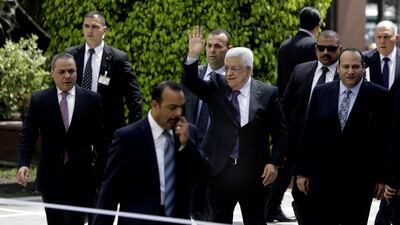CAIRO // Arab foreign ministers yesterday joined the chorus of criticism of Israel for derailing the Palestinian peace talks and pledged to continue their $100 million in monthly aid to the government of Palestinian President Mahmoud Abbas.
Israel was “wholly responsible for the dangerous stalemate”, they said after a meeting with Mr Abbas.
On Tuesday, US Secretary of State John Kerry also blamed the approval of Israeli settlements in annexed Arab east Jerusalem for derailing peace talks with the Palestinians, but accused both sides of intransigence.
Wednesday’s emergency meeting was requested by Mr Abbas after Israel backtracked on releasing a final batch of Palestinian prisoners and reissued tenders for 708 settler homes in east Jerusalem.
The Palestinians responded to the Israeli decision regarding the prisoners by applying to adhere to 15 international treaties, breaking their own commitment to refrain from such action during the nine months of talks.
The tit-for-tat moves came as a major blow to Mr Kerry’s frenetic efforts to find a way to extend the fragile peace talks beyond an April 29 deadline.
“Despite all, we are committed, as Palestinians and Arabs, to the negotiation process and the efforts exerted by Kerry to find a way out of this crisis”, Palestinian foreign minister Riyad Al Malki said.
Arab League chief Nabil Al Arabi accused the Israelis of dragging their feet in the talks, telling reporters: “Gaining time is a strategic objective for Israel.”
The talks have teetered on the brink of collapse, with Washington fighting an uphill battle to get the two sides to agree to a framework proposal to extend the negotiations to the year’s end.
Israel says its release of each batch of prisoners was conditional on progress in negotiations.
Israeli prime minister Benjamin Netanyahu ordered his ministers to cut off contact with their Palestinian counterparts.
The move was retaliation for the Palestinian aiming to to join UN agencies, which the official said was a violation of the their commitment in the peace talks. The Palestinians dismissed the Israeli move, saying both sides rarely meet now as it is.
Under the peace talks’ terms, Israel promised to release 104 long-held Palestinian prisoners in four groups. At the same time, the Palestinians said they would suspend a campaign to sign up Palestine, recognised by the UN General Assembly as a non-member observer state, for as many as 63 UN agencies, treaties and conventions.
Mr Abbas signed letters of accession for 15 international conventions after Israel last week failed to release the fourth group of prisoners and renewed a push to build homes in an Israeli settlement in east Jerusalem — the area of the holy city sought by the Palestinians for their future capital. Israel then called off the final prisoner release.
Under Mr Netanyahu’s order, Israeli Cabinet ministers and their ministry directors can no longer meet Palestinian counterparts, though lower-level contacts will continue, said the official, who spoke on condition of anonymity as he wasn’t authorised to discuss the matter publicly. The official said Israel’s chief peace negotiator, Tzipi Livni, would be exempt from Netanyahu’s order, suggesting the actual effect of the order on the talks would be minimal.
High-level contacts between top Israeli and Palestinian officials are already rare, Palestinian government spokesman Ihab Bsaiso said.
“This won’t affect our daily life or government business,” Mr Bsaiso said.
Mr Bsaiso did express concern that Israeli tax transfers to the Palestinians could be disrupted. Under interim peace accords, Israel collects taxes on behalf of the Palestinians and then transfers the funds each month. The exact sum of the money, roughly $100 million (Dh 367 million), is set in talks between senior finance officials.
Without this money, the Palestinian Authority would have a difficult time paying the salaries of its tens of thousands of employees. Israel’s Finance Ministry did not immediately reply to requests for comment.
Mr Netanyahu’s order is the latest step by Israel to sanction the Palestinians for their UN bid. Israel also has prevented Palestinian mobile phone company Wataniya from transferring equipment to Gaza.
“And, poof, that was sort of the moment,” Mr Kerry said. “We find ourselves where we are.”
* Agence France-Presse and Associated Press

